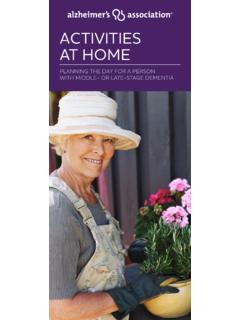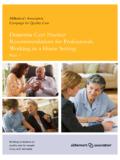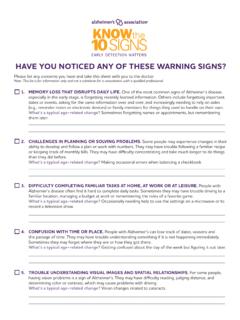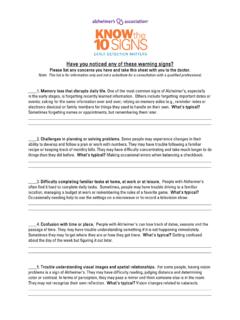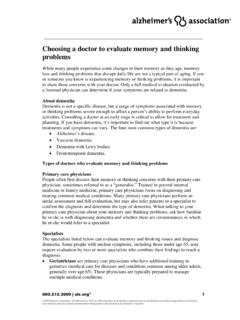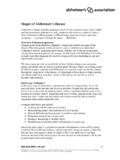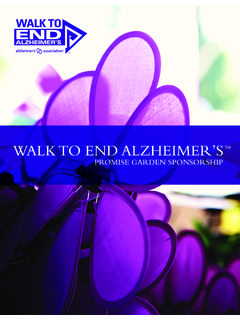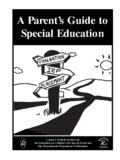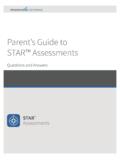Transcription of Parent's Guide: Helping Children and Teens …
1 Parent's GUIDEHELPING Children AND Teens UNDERSTAND alzheimer S DISEASEHOW alzheimer S DISEASE AFFECTS KIDS AND TEENSA lzheimer s can have a big impact on every member of the family, including Children . Each child will react differently to someone who has the people might have questions about what's happening as the disease progresses. It s important to answer these questions openly and honestly, and share with them the changes the disease might that may affect your child include: His or her relationship to the person with dementia (a parent, grandparent, relative, friend). How close your child is to the person emotionally.
2 Where the person lives (in the same home, long-term care facility, another state).1 CONTENTS1. Common reactions .. Special issues for Teens .. Common questions .. How parents can help .. COMMON REACTIONS When a family member is living with dementia, your child or teen might feel: Sad about how the person is changing. Curious about how people develop alzheimer 's. Confused about why the person acts differently or doesn t recognize him or her. Frustrated by the new things it s necessary to do, like repeating words or phrases. Guilty for resenting the time and resources the person requires of the family.
3 Afraid of how the person may behave. Jealous of the additional time and attention given to the person. Worried that he or she or other friends and family members might also develop alzheimer s. Embarrassed to have visitors if the person is home. Unsure how to behave around the of these feelings are normal. However, alzheimer 's disease impacts people, including Children , in different ways. Some may respond with many of these reactions while others may have few problems or questions. ENCOURAGE JOURNALINGW riting down thoughts and expressing feelings in a journal can bring comfort to your child or might be difficult to recognize how your child is feeling.
4 A child who is having a hard time understanding or accepting the disease might: Withdraw from or lose patience with the person with dementia. Express physical pain, such as an upset stomach or headache. Do poorly in school. Spend more time away from home. Stop inviting friends home to visit. Argue more, especially with those providing care for the person with alzheimer SPECIAL ISSUES FOR Teens Adolescence is challenging, and the disease may bring even more changes to your teen s life. For example, you may need to ask your child to pitch in more around the house or to assist with may express a variety of thoughts, both good and bad, about how their lives have changed, such as: When I help out with my uncle, I feel like my family really needs me.
5 I feel good that I know how to do the little things that make a difference for my dad. I ve never felt closer to my mom than I do now because we re facing this together. I don t like to talk with my friends about what s going on. Sometimes I feel embarrassed about how my grandpa is acting. I don t feel comfortable having friends over. My parents don't have as much time for me because my grandma takes all their attention. It's not fair to ask me to do so much. I'd rather be doing something ACTIVITIES Children AND Teens CAN DO WITH A PERSON WITH DEMENTIA1. Bake Take a walk around the Put a puzzle Weed a garden or plant flowers.
6 5. Color or draw pictures, or look at Create a scrapbook or fill a memory box with Read a favorite book or Eat a picnic lunch Watch reruns of old TV shows Listen to or sing favorite COMMON QUESTIONS Encourage your child to ask questions. Answer honestly and using age-appropriate explanations. The alzheimer 's association can provide you with information to help answer these questions and suggestions for coping with changes that accompany the answers to questions your child may ask:Q: What is alzheimer s disease?A: alzheimer s is not just memory loss; it s a disease that affects how the brain works and how a person thinks.
7 Over time, it also changes the way a person s body : Will my mom get alzheimer s, too? Will I?A: Many scientists believe that there s a greater chance of getting the disease if someone in your family has it, but not everyone who s related will get it. Most people who develop alzheimer s are older. Q: Why does my grandpa call me by my dad s name?A: Changes inside your grandfather s brain may make it difficult for him to remember things like your name. This is not your fault or his. You may remind him of your dad at your age. It s best not to correct him, as that could upset or frustrate : Will my grandma die from alzheimer s?
8 A: We don t know for sure. Some people with alzheimer s do die from the disease, while others may pass because of another serious health condition. 7Q: Why does my aunt keep asking the same question?A: People with alzheimer s often remember events that happened years ago, but forget things that happened yesterday or even a few minutes ago. Your aunt may not remember that she already asked a question. It s important to be patient and respond, even if you ve already done : How can I help my grandpa?A: Simply being there for your grandfather can show you care. Even when he reaches the point where communication is difficult, love and kindness can be felt in the : Will my uncle get better?
9 A: Your uncle will have both good and bad days. Even though there are no treatments or a cure yet, scientists are working really hard to find : Will I get alzheimer s if I spend time with my aunt?A: alzheimer s is not contagious. You can t catch it from other people like you can the flu or chickenpox. It s a degenerative disease, which means it develops in the brain over : What are some things we can do together?A: Simple activities like listening to music, setting the table, reading a book and looking at photographs are great ways to spend time with the person with alzheimer : Will my grandma forget me?A: As your grandmother s brain changes, she may forget many things, but she will still be able to feel your love.
10 84. HOW parents CAN HELP Keep lines of communication openGood communication is the best way to help your child deal with the changes that are questions honestlyRespond simply to questions in an age-appropriate way. Try not to sugarcoat the message. Children are excellent observers and often aware if an answer doesn t sound right. Help your child learn more about alzheimer 'sBegin sharing information about the disease and its symptoms as soon as you can. Use words that are easy to understand and encourage your child to ask questions. Reassure your child that just because a person in the family has alzheimer s, it doesn't necessarily mean that he or she or other family members will get the disease, too.
